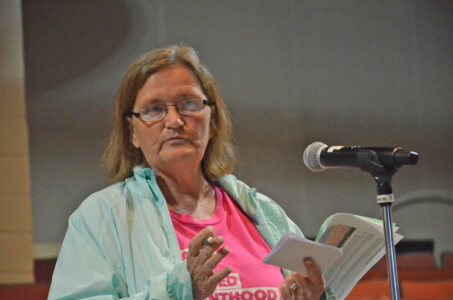Jones, Little talk health care, broadband, Camp Gabriels

From left, state Sen. Betty Little, Tupper Lake village Mayor Paul Maroun and state Assemblyman Billy Jones stand in August at the site of the Tupper Lake bandshell. (Enterprise photo — Aaron Cerbone)
TUPPER LAKE — State Sen. Betty Little and state Assemblyman Billy Jones visited this village’s bandshell construction site last Wednesday, discussing the progress of locally relevant bills, the possibility of state wide single-payer health care and what they have been doing in the time they are out of legislative session.
The Senate and Assembly held their last days of session June 20 and will both return Jan. 3 unless they are called back earlier for particular business. In the meantime the two are touring their districts, visiting each town to talk with government officials, constituents and business owners about legislation to introduce come January.
“Good legislation always comes from your constituents,” said Jones, a Democrat from Chateaugay.
Jones was disappointed the Assembly did not pass his constitutional amendment which would allow the state to sell or lease the former state minimum-security correctional facility, Camp Gabriels, to a public or private buyer. The 92-acre, 48-structure property is arguably in the state Forest Preserve and therefore cannot be sold. This has vexed local government leaders, who want to fill the facility.
The amendment — which passed the state Senate toward the end of its session thanks to Little, a Republican from Queensbury — would alter Article 14, the “forever wild” clause of the state constitution. It makes the claim that Camp Gabriels “was not intended to be included in the Forest Preserve,” as the property’s deed, deems the land “not suitable for state Forest Preserve.”
The lack of Assembly passage was a significant setback for the plans to sell because constitutional amendments need to pass two separately elected Senates and Assemblies, and then a statewide referendum. Now the earliest it could get on the public ballot is 2020.
Jones said the amendment will be a priority for him next session and that he will talk over the summer with the chair of the Assembly Committee on Environmental Conservation, Steve Englebright.
“At the end of the session it got tied into some other stuff,” Jones said. “It’s unfortunate, but I’m confident that we’ll get this in there.”
Another priority for Jones, he said, will be the passing of the Jamie Rose Law, which would require public officials and professionals to report suspected cases of domestic violence to superiors and social services.
Jones said it was a “meaningful bill” to him, as he has met with the family and friends of Jamie Rose Martin, who was killed by her ex-boyfriend in a murder-suicide at her Tupper Lake home in May last year.
Health care options
Following the release of a RAND Corporation study, compiled on a commission from the New York State Health Foundation, single-payer health care supporters are still pushing for New York to become the first state to enact the much-debated legislation.
The New York Health Act would provide universal insurance coverage with no co-pays, deductibles or premiums for all New Yorkers, regardless of immigration status. The study found that the system is financially feasible and could curtail spending in future years. The study found that single-payer health care would raise utilization while saving the system $15 billion, about 3.1 percent, by 2031. But it would also raise taxes.
Neither Little nor Jones is ready to support it on a state level. Little said she supports single-payer health care at a federal level, but not just for New York state alone.
Little said she wants everyone to have health care coverage, but that but having government provide it on the state level would do more harm than good.
She said New York is not prepared to handle the influx of population it would see as a result of universal health insurance coverage, adding that the state already has issues attracting doctors.
Jones echoed the same points, saying he thinks the federal government should take the lead on it. He added that he has liked the conversation the focus on statewide single-payer health care has opened about health insurance solutions.
Calls for better broadband
Both Little and Jones said they are going to spend their time in and out of session fighting for broadband companies and the governor’s broadband office to expand service in the North Country.
“We need to be connected. We need it for our business, our schools, our universities, everything,” Jones said. “We live in a very rural area, and we need to be connected to the world.”
“Would you go anyplace without a cellphone or broadband?” asked Little, whom Jones called “Queen of cellphone service in the North Country.”
“I never met a cell tower I didn’t like,” Little said.
She talked about how the town of Duane wanted to erect a 95-foot cell tower on a base that could hold a 120-foot tower, but because of the state Adirondack Park Agency the town ended up with 65-foot one, which, Little said does not provide adequate coverage.
She said more broadband is needed when more tourists are in town, and taller towers would allow more than one company to put equipment on them.
“What sense does it make environmentally in building several shorter towers when you have to build the base anyway?” Jones asked. “So why don’t we build fewer ones with a higher tower that will cover more people?”
At the end of the 2018 session, Jones said, the Assembly passed a $100,000 budgetary item for North Country Veterans Association and $250,000 for Senior Planet, a program which teaches internet skills to the elderly.





